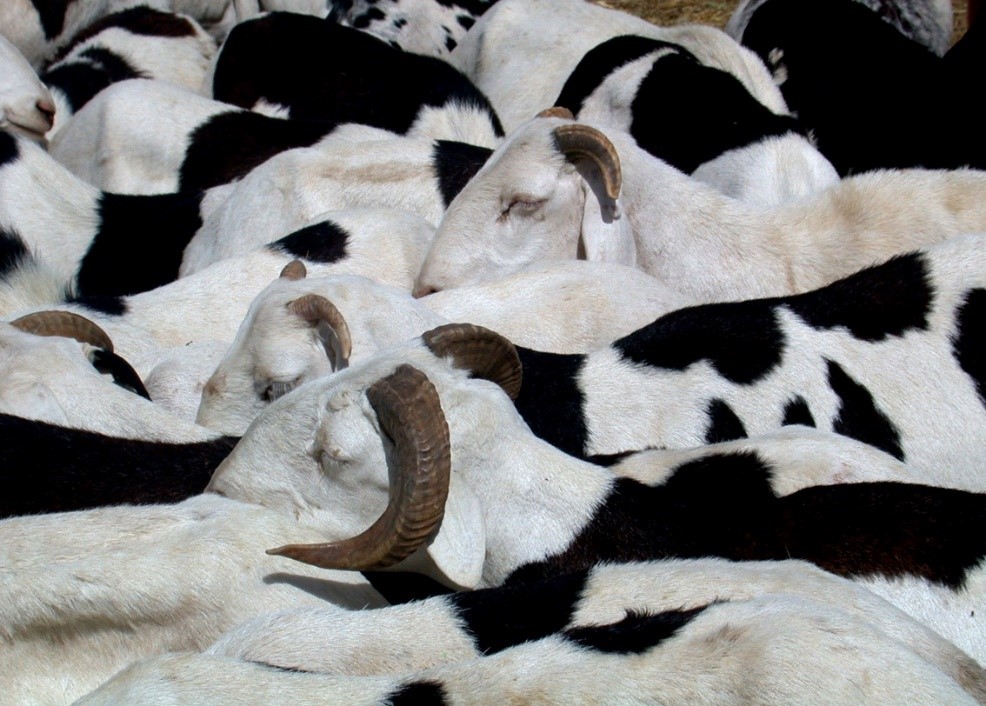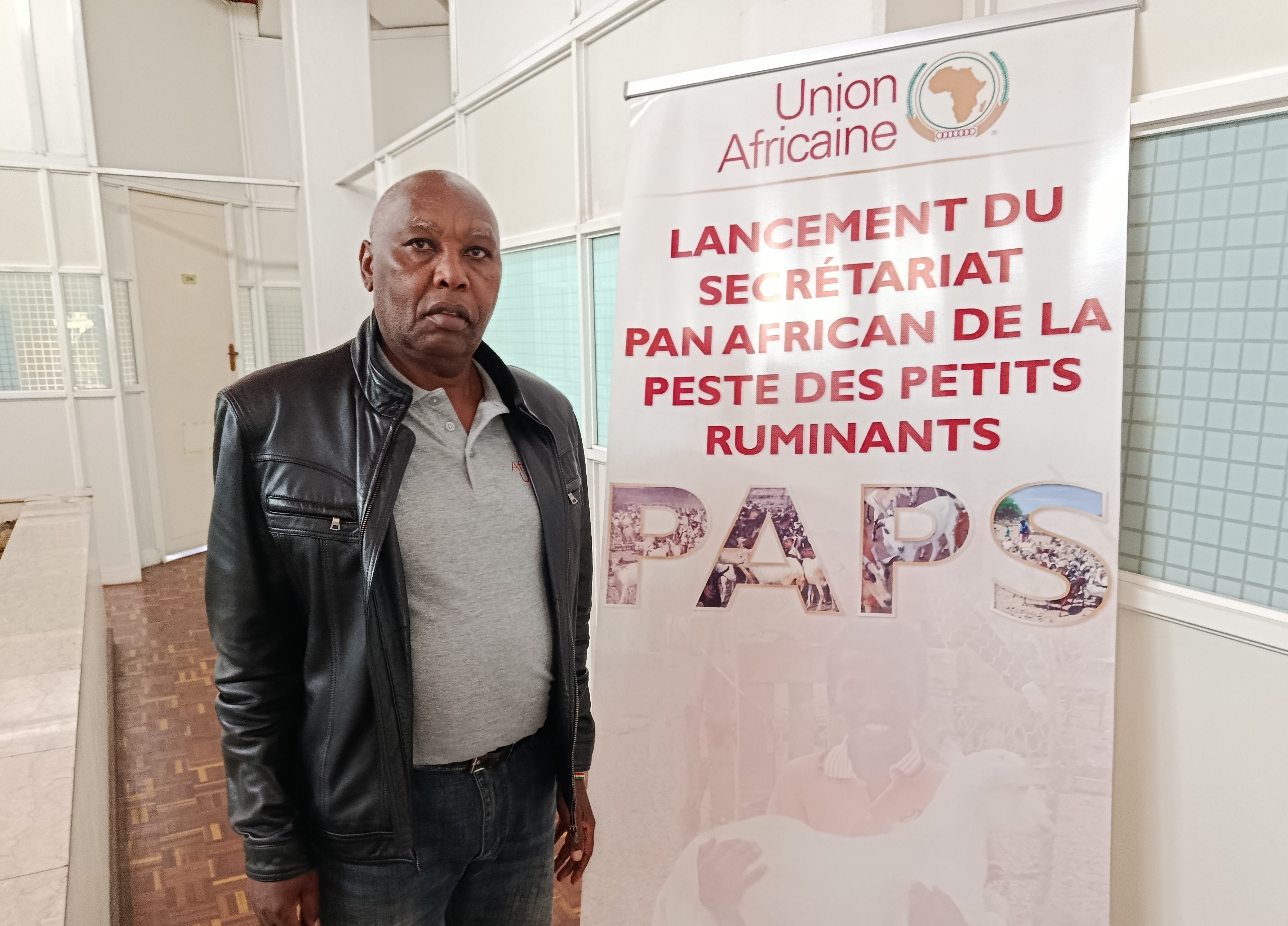
Dr Simon Kihu, at AU IBAR offices in Nairobi, Kenya. Picture © Communication (AU IBAR) 2025.
The World Organisation for Animal Health (WOAH) seconded Dr. Simon Kihu to the Pan-African PPR Secretariat (PAPS) of the African Union Inter-African Bureau for Animal Resources (AU-IBAR). This strategic move demonstrates WOAH’s commitment to bolstering Africa’s involvement in the global fight against peste des petits ruminants (PPR), a transboundary animal disease that is slated for elimination by 2030.
PPR is a highly contagious viral disease that affects sheep and goats, with fatality rates of up to 90% in naive populations. With over 770 million small ruminants supporting the livelihoods of 300-500 million people in Africa, epidemics are both a veterinary emergency and a serious development concern. Economic losses range between USD 1.5 and 2.1 billion each year, with implications for food security, biodiversity, and regional trade.
The PAPS comprise a Team leader (AU-IBAR Senior Animal Health Officer), a Programme Officer (AU-IBAR Project staff), a Communications Officer (AU-IBAR Project staff), an Epidemiologist (FAO Project seconded staff to AU-IBAR ), a Laboratory Expert (AU-PANVAC Project staff will be based at AU-PANVAC in Debre-Zeit, Ethiopia), an Animal Health Expert (WOAH Project seconded staff to AU-IBAR) and an M&E Expert (AU-IBAR Project staff based at AU-IBAR).
To drive the implementation of WOAH key project activities, Dr Kihu has been seconded to the PAPS as the WOAH Animal Health Expert. He took up his position as of 1st July 2025.
Recognising these challenges, WOAH and the Food and Agriculture Organisation of the United Nations (FAO) established the Global Strategy for the Control and Eradication of PPR (PPR GCES) in 2015. The strategy established an ambitious aim of eradicating PPR globally by 2030. During the first phase of the Global Eradication Programme (PPR GEP I, 2017-2021), more than 68 nations developed National Strategic Plans, and 59 countries and one zone achieved OIE, and – since – WOAH recognition of PPR-free status.
The second and third phases of the programme (PPR GEP II and III) provide a detailed blueprint for eradication, with milestones that include:
Previous attempts in Africa have been fragmented and under-coordinated, limiting progress. To address this, the European Union recently provided funding for the Pan-African PPR Eradication Programme (2023-2027), which is being undertaken by AU-IBAR in partnership with AU-PANVAC, FAO, and WOAH. The PAPS programme was launched in May 2023 during the 90th WOAH General Session and is coordinated by the Pan-African PPR Secretariat (PAPS),
PAPS acts as the continental coordinating hub for eradication operations, assuring consistency, capacity building, and alignment with the global program. Its team includes professionals from AU-IBAR, AU-PANVAC, FAO, and WOAH, demonstrating a collaborative, integrated approach.
As the global standard-setting authority for animal health, WOAH plays a critical role in supporting Member Countries in setting international standards for surveillance, immunisation, outbreak response, and commerce. Its processes and mechanisms for recognising PPR-free status and endorsing official control plans establish a harmonised framework for progress, transparency, and accountability.
WOAH’s technical support to PAPs focuses on:
Dr. Kihu’s secondment to AU-IBAR ensures WOAH’s leadership is embedded within continental coordination structures. As Animal Health Expert at PAPS, he will guide technical interventions, support the implementation of national and regional control programmes, and strengthen alignment with the global eradication strategy.
PPR eradication is both technically feasible and politically imperative. The lessons from rinderpest eradication in 2011 show what can be achieved through coordinated global action. Success against PPR would not only safeguard livelihoods and food security but also reinforce Africa’s veterinary systems, positioning them to respond to future animal health and zoonotic threats.
Through the secondment to AU-IBAR, WOAH reinforces its commitment to a united, science-based, and coordinated African contribution to global PPR eradication by 2030.
To achieve the 2030 eradication target, coordinated commitment is essential. Policymakers, donors, and regional stakeholders are urged to:
The eradication of PPR is within reach. With strengthened continental coordination, global partnerships, and unwavering political commitment, Africa can play a leading role in consigning this devastating disease to history.


